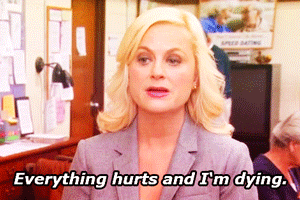We need to talk about my drinking. In a different way. Because I have concluded I drink, not to get drunk, but for the hangovers.
“It’s helpful to notice that,” as my therapist says. Rather than, you’re batshit crazy. (I could say I am a war criminal or the Dalai Lama and she would say it was helpful to notice that.) But this time she is right. It truly is helpful. Because crazily, working this out has helped me to change.
Why would you want a crippling, loo-clutching, bean-splitting hangover? It sounds wackily perverse I know. “The light did her harm, but not as much as looking at things did; she resolved having done it once, never to move her eyeballs again…
Her mouth had been used as a latrine by some small creature of the night, and then as its mausoleum… During the night too, she’d somehow been on a cross country run and then been expertly beaten up by secret police.” (A Kingsley Amis hangover.)

There are metaphysical symptoms too. Crushing remorse. I am Richard Scarry’s Lowly Worm. My very existence feels precarious, not surprisingly since I can’t find my cashflow card, my phone and my jaunty Karen Walker sunglasses. Why would anyone want to feel this terrible?
The truth is sometimes you have to get a little bit closer to death to feel truly alive.
When you bang your head against a brick wall it is bliss when it stops. Or, as Mark Twain says, you could eat a live frog for breakfast because then you can proceed with the satisfaction of knowing that is probably the worst thing that is likely to happen to you all day. Hangovers are the live frog.

This is the bizarre anatomy of a hangover. Because when you’ve been crushed by wave after wave of nausea and agony, and rehydrated with several litres of water, something changes. There are tiny green shoots. You start gradually at first and then with increasing certainty, to realise you are still alive. ALIVE!
Even the tiniest things, a cold smooth pillow, a hot cup of coffee feel glorious, unique, beautiful. Finding your cashflow card is joyous.
Discovering your friends are still talking to you even though you made them drink dirty martinis and accidentally set their hair on fire is like being rescued from an icy gulag in Siberia.
You are not to be cast out to be eaten by wolves after all. Each small step towards the restoration of normality is a symbolic gesture from the universe. You’ve been given another chance at life. You’ve been to the edge of the abyss and come back. After the hangover comes redemption. And comfort food.

You’re going to live a life of abstemiousness and austere Marie Kondo-ish simplicity and unremitting virtue. You are going to iron your sheets and eat goddess-like steamed vegetables. For days afterwards I feel renewed and delighted with the sweet everydayness of ordinary life.
But now I wonder, just wonder, whether maybe I could feel like this without having to do all that drinking? Could I get a sparkly fresh sense of rebirth with some other kind of circuit-breaker, that is less, well, like a liquid version of self-harming?
People cut themselves or self-harm as a way to discharge emotional pain, because counter-intuitive as it may sound, hurting yourself can make you feel like you are taking control of your own pain. Self-harmers have an unbearably harsh self-critical inner voice.
One of the techniques recommended for people trying to stop self-harming is avoidance – that is keeping occupied with other activities; holding a smooth pebble (yes, really) washing the dishes or listening to music. Which all sound rather feeble, to me. I like playing Word Cookies as my distraction activity, but still…

There are healthier ways to inflict pain on yourself. I like watching grisly Scandinavian noir programmes. Listening to Metallica very loud might work. And reading Nietzsche (What doesn’t kill you makes you stronger.) Maybe one day I will join CrossFit – that has got to have a similar pain profile. Or I could just make myself a really, really hot curry.
But I’m not sure substituting one form of pain for another is the answer.
The mechanism for why a hangover works is because it gives you a temporary break from yourself.
Who doesn’t want a bit of a holiday from yourself? That sheer moment-by-moment drudgery of being you.
And the monotony of ordinary life – if I have to fold yet another load of washing I will scream – whereas in post-hangover mode, the Zen-like privilege of folding washing is something to write in your gratitude journal.
But the part of our-selves we most need a break from is the persecutory inner voice. On the morning after, for a little while, the voice says: “It’s okay, you’re alive, and that’s enough.”

So instead of taking up base jumping or getting a sleeve tattoo, wouldn’t it be better if I could learn to quiet that voice some other way? It always comes back to the same old thing, doesn’t it?
And the answer is the same thing one has to learn over and over, that the harsh judgemental voice comes from the wounded part of you that most needs your love. It is part of you that has been exiled from you, and what it needs to come home to you, is your love and acceptance. Not another cocktail.

